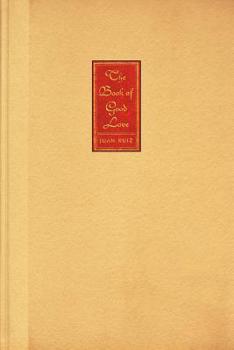The Book of Good Love
Select Format
Select Condition 
Book Overview
Tambi n llamado Libro de los cantares, es una obra del mester de clerec a del siglo XIV. Es una composici n extensa y variada de 1728 estrofas, cuyo hilo conductor lo constituye el relato de la... This description may be from another edition of this product.
Format:Paperback
Language:English
ISBN:1588710025
ISBN13:9781588710024
Release Date:August 2005
Publisher:Juan de La Cuesta-Hispanic Monographs
Length:336 Pages
Weight:1.15 lbs.
Dimensions:0.8" x 6.0" x 9.0"
Customer Reviews
4 ratings
Good service
Published by Thriftbooks.com User , 14 years ago
From the friend for whom I ordered this book, I gather that it arrived promptly and in good condition.
Book of Good Love, Kent Kane translation
Published by Thriftbooks.com User , 14 years ago
Nobody translates the «fun» in the Book of Good Love the way EKK does. There are many good translations but, if you must read it in translation, and you wish to feel the Archpriest's playfulness, this is the one to read.
Excellent edition of the Libro de buen amor
Published by Thriftbooks.com User , 16 years ago
Libro de buen amor, by Juan Ruiz, Arcipreste de Hita. Edited by Alberto Blecua for Letras Hispánicas. ISBN 8437610117. Ordinarily I do not review books which I have not finished reading; but because this edition of the Libro de buen amor has received no reviews, and because my review will deal primarily with the edition and not with the work itself, I'll add my two cents. Here's the table of contents: ------------------------------------ Introducción El hilo narrativo La fecha y el autor La invención El artista Manuscritos y ediciones Los problemas textuales Errores separativos de a Errores de a o de x Errores no significativos de x La rama S Intervenciones de Paradinas Las innovaciones de la rama S La rama G La rama T El problema de las dos redacciones La lengua del arquetipo La métrica Criterios de Edicion El texto Las variantes Notas Libro de buen amor (Blecua here lists each section by title and page number) Variantes graficas y lingüísticas Notas suplementarias Indice de voces Indice de nombres propios ------------------------------------ As can be seen from the contents, Blecua does a thorough job discussing the textual problems of the LBA, and it's dry going unless you're interested in textual criticism. He also devotes seven pages to the meter, which along with the text, is "el otro gran problema que plantea el LBA." The metrical discussion, which of course assumes a basic knowledge of Spanish prosody, is of more practical use to the average reader than the textual one. For attempting to tackle the LBA without understanding the meter is as preposterous as reading Shakespeare and not knowing why he placed line breaks where he did. The copious notes are of course designed for the SPANISH-SPEAKING undergraduate, and so idioms which might escape a native English speaker are not explained. Blecua explains his procedure thus: "[. . .] he puesto dos tipos de notas: unas, a pie de pagina, para el lector mas lego; otras, en el apendice, para discutir con la clerecia experta." The footnotes sometimes gloss one word, sometimes half a line, sometimes whole lines: anything which might present "dificultades para un estudiante de bachillerato." Since not all readers begin at the beginning and read the LBA through, he repeats throughout common glosses such as "inmediatamente" for "luego," "hora sexta" for "siesta," and "bienes materiales" for "algo." The endnotes are primarily philological and rather technical. The bibliography is thirty pages, and cites works in Spanish, English, French, and German. The language of the text is not modernized, but the spelling is slightly modernized. Blecua replaces the long s and sigma with the modern `s,' reduces double consonants, and modernizes the usage of `u' and `v.' He preserves, however, the `c' with cedilla, along with other characteristics of fourteenth-century Spanish. Here are the firs
The Spanish Chauser
Published by Thriftbooks.com User , 20 years ago
This is the translation of a Spanish book by an archpriest. It was then consisdered by many to be vulgar, but Elisha Kane, the translator of this volume found it to be most interesting and, with his brillant translation, shows the reader how so. It is full of wit and makes a wide use of play on words. It is the story of a busybody named Trotaconventos who sticks his nose into other people's business - especially when it involves love. He tells of a clergyman who gets involved with a woman. The book questions the distinction between sacred and romantic love. Should a man of the church be above reproach? Kane has illustrated the rhyming quatrains with impish cartoons. Kane was a professor of Romance Languages when he did the translation.




